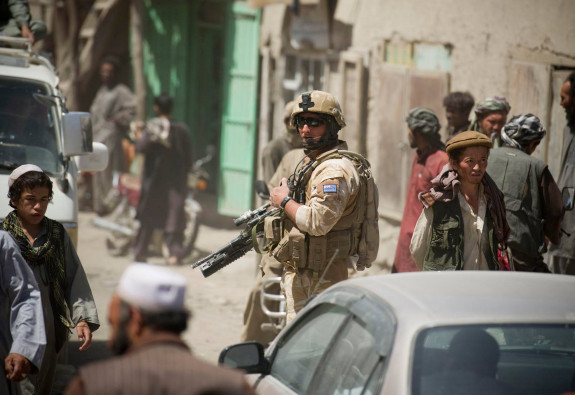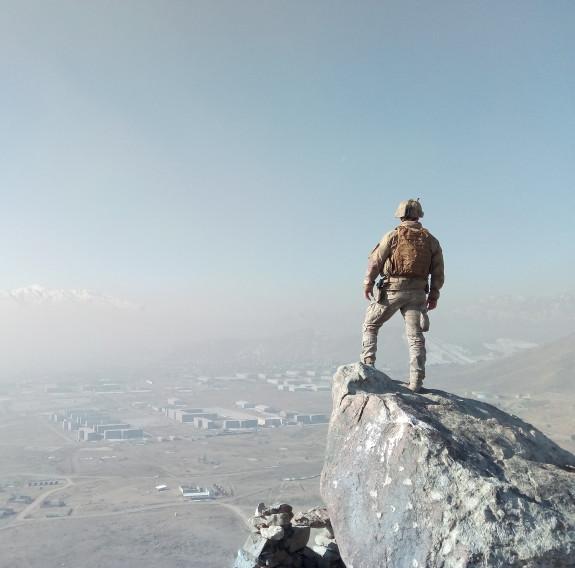Afghanistan
A 20 year commitment
The New Zealand Defence Force's relationship with Afghanistan is built on 20 years of deployments to the country. Missions included Special Forces operations, provincial reconstruction activities and capacity building through training of local forces.
2001 – 2014 NZ Special Air Service (NZSAS deployments)
The NZDF undertook a number of separate deployments of the NZSAS to Afghanistan between 2001 and 2014. They undertook combat operations as part of the international intervention into Afghanistan, working closely alongside partners and local forces.
Long range patrols were initially conducted in order to gain an understanding of the political, social and security situation. Counter-terrorism combat operations disrupted and defeated insurgent threats, including Al Qaeda and Taliban, and established the security and stability necessary for broader international assistance to be realised and the Afghan Government to exercise authority across much of the country.
In subsequent deployments, the SAS worked alongside Afghan Forces, specifically the Crisis Response Unit (CRU), mentoring the Special Police Unit to build capacity and ensure personal development. The CRU continued to sustain itself following the NZSAS departure from Afghanistan and it was one of the most professional and frequently utilised assets within Afghanistan’s national security architecture.
NZSAS undertook numerous operations in Afghanistan, including high risk arrests, explosive ordnance disposal, improvised explosive device disposal, counter narcotics, counter insurgency and counter terrorism. These actions disrupted many threats and by countering these threats, NZSAS contributed to national, regional and global security while upholding the rule of law in Afghanistan.
In 2020, a Government inquiry considered three of the operations undertaken by NZSAS – Burnham, Nova and Yamaha. Implementation of the recommendations of the inquiry's report is underway.
Sadly, two NZSAS servicemen lost their lives while serving in Kabul, Afghanistan.

2003 – 2013 NZ Provincial Reconstruction Team (NZPRT) deployments
The purpose of the NZPRT deployment from 2003 to 2013 was to strengthen the influence of the Afghan Government by assisting with the reconstruction of Afghan institutions, facilitating aid efforts, monitoring disarmament and providing security. NZPRT was based in Bamyan province, while other NATO International Security Assistance Force (ISAF) contributing states similarly deployed PRTs with responsibilities for other provinces in Afghanistan.
The NZPRT was comprised of around 140 personnel and was made up from NZDF, New Zealand Police and Ministry of Foreign Affairs staff. It delivered over 200 development initiatives in Bamyan province, at a value of more than $100M and included security sector reform, support for local government, and reconstruction of infrastructure such as bridges, roads and local power supplies.
The NZPRT’s primary responsibility was to promote security in the Bamyan province that would enable a legitimate government to re-establish control and create the conditions necessary for economic recovery. The NZPRT were equipped for self-defence only and not intended for enforcement tasks. It maintained security by conducting presence patrols in Bamyan province, demonstrating the importance of being seen and readily available to address concerns of the community. This did not make NZPRT immune to insurgent attacks however, and eight NZPRT personnel lost their lives over the course of the deployment. Bamyan was among the first tranche of provinces handed back to Afghan-led security in 2013. NZDF personnel deployed to the NZPRT maintained operational readiness on five live-firing ranges in Bamyan Province. Work is currently underway to complete additional clearance of these ranges to current international standards.
2003-2021 Capacity building and Headquarters roles
Following the conclusion of the NZPRT deployment in 2013, the New Zealand contribution in Afghanistan transitioned to supporting the development of Afghan forces, through the deployment of NZDF trainers and mentors to the Afghanistan National Army Officer Academy (ANAOA). The NZDF also deployed trainers in small numbers to support the Afghan Army in the years 2003 to 2012.
The ANAOA was one of Afghanistan’s leading centres for officer training. The officers trained there went on to hold leadership positions within the Afghan Army. NZDF personnel provided training not only in technical skills, but were also able to promote New Zealand’s leadership values and ethos. New Zealand’s contribution assisted in the training of more than 5,000 Afghanistan Army Officer Cadets. Over 250 of these graduates were female.
Providing training and support to Afghan forces was the central feature of the NATO Resolute Support Mission (RSM) which commenced on 1 January 2015. The strategy behind this was to empower Afghanistan to be able to maintain its own security, eventually without international support. New Zealand’s contribution to this mission ended in March 2021, when the Academy reached a point of being self-sufficient.

Evacuees board the Hercules aircraft at Hamid Karzai International Airport in Kabul in August 2021
2021 Afghanistan Evacuations
In August 2021, due to a deteriorating security situation, the NZDF once again deployed into Afghanistan as part of Operation Kōkako – this time on a multi-agency humanitarian mission. Around 80 of our Army, Air Force and Navy personnel and a Royal New Zealand Air Force C-130H(NZ) Hercules aircraft deployed to assist with international efforts to evacuate New Zealanders and other foreign nationals from Kabul. Personnel included special forces troops, a female engagement team, aircrew and maintenance staff, a medical team, operational support staff, logistics personnel and force protection personnel, amongst others. Our deployed contingent were supported by over 500 of our military and civilian personnel based in New Zealand, and elsewhere around the globe, who were directly involved in planning, liaison, deployment preparations and execution of the operation. It proved to be a challenging mission given the changing circumstances on the ground in Afghanistan, however our NZDF personnel, and those involved in the planning and mission execution in New Zealand, made every effort to help get New Zealanders and other eligible evacuees out of Afghanistan safely.
